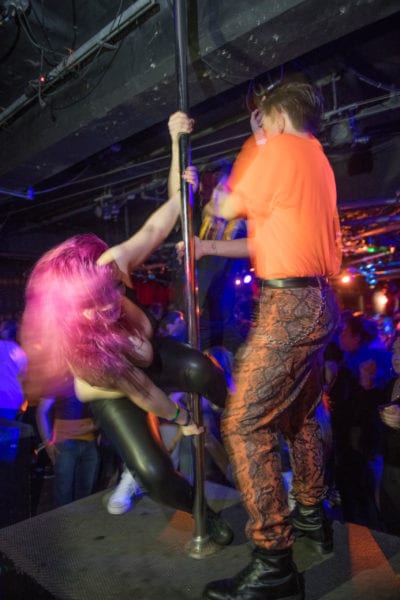As an entire industry teeters on collapse, many stakeholders are scrambling to find ways to survive

Earlier this month, the Baker administration gave the green light for Phase 2 of the reopening of the Massachusetts economy. With it, restaurants and bars (with kitchens) are allowed to open outdoor dining sections and, later, in Step 2 of Phase 2, indoor dining sections.
If all goes well, Phase 2 could wrap up three weeks after it started much like Phase 1 had, which means that Phase 3 could possibly begin as early as June 29. And while Phase 3 currently doesn’t affect dining and drinking spots one way or the other, Phase 4 does, representing the “new normal” in the Boston area and elsewhere in the state—and Phase 4 is when bars without kitchens can open, as can nightclubs and dance clubs.
So does this mean that music clubs could be returning as early as July 20, assuming that Phase 3 lasts three weeks? Unfortunately, this isn’t the case, because Phase 4 is based on having a vaccine and/or a therapeutic, so Phase 3 will not only be longer than three weeks, but possibly a lot longer than three weeks, possibly extending into 2021, leaving those in Phase 4 in deep trouble.
Because of the uncertainty regarding Phase 4, many bars in Massachusetts that don’t have kitchens—along with breweries, beer gardens, and wineries with no seated food service—are now working on getting into Phase 2 via applying for common victualler licenses, purchasing equipment such as convection ovens, and setting up makeshift outdoor areas. In most if not all cases, those that do this should be ok, especially since so many cities and towns are helping out by fast-tracking food permits and allowing places to use parking lots, public spaces, and even parts of streets for temporary outdoor patios.
In the case of many music clubs, however, taking such steps is much more difficult, especially for those clubs that don’t have setups for kitchen areas—no matter how small—and for those in densely populated areas, finding places for outdoor seating—and if they don’t have kitchens, perhaps food trucks—can be extremely tough. Because of this, music clubs (along with nightclubs and dance clubs in general) are basically staring into the abyss, not just in the Boston area and elsewhere in the state, but in many other parts of the country, threatening not only to decimate an entire industry, but also a big part of American culture, as bands and solo artists find themselves unable to perform live in person in front of audiences, which, in the post-CD era, is devastating because for some, live shows are a more important source of income than ever.
Even if a therapeutic—such as a drug cocktail—is discovered quickly, or an effective vaccine is somehow fast-tracked (very unlikely), and Phase 4 begins earlier that originally thought, music clubs will still face the daunting task of convincing patrons that crowding together into a small room or a big concert hall is no longer risky. Outdoor venues could be in better shape simply because there is often much more space—and being outdoors does generally appear safer than being indoors—but even they might not see the same numbers as before the COVID-19 pandemic because people might still be a bit gun-shy about being around so many others even if there is a cure or treatment. But all of this is probably a moot point anyway, as there is no indication that a vaccine or therapeutic is anywhere near being ready for the general public.
So where does this leave music and comedy clubs—and performers—right now? Well, they obviously need help, and more government assistance is one answer for sure, though there are no guarantees that this will continue, especially if other businesses and industries get back on their feet over the coming weeks and months, making it appear that all industries are recovering. Private fundraisers can definitely be a good option, though with so many people out of work and struggling to pay bills, this can be a hard sell, at least in the immediate future.
Pivoting into other areas, including selling merchandise and live-streaming concerts online, are currently helping both clubs and musicians right now, though the income generated likely won’t match that of having audiences coming to live shows. (If you go to the websites of both clubs and bands/musicians, you will likely see such items as CDs, stickers, T-shirts, koozies, and more.) Setting up outdoor areas, including drive-in type experiences where people can watch live bands from their cars, is a novel and workable concept that Tupelo Hall in Derry has been doing, though a lot of room is obviously needed for something like this, so this is generally not an option for clubs and halls in more urban areas.
Without government and audience support, simply getting out of the music business—at least temporarily—may be a somewhat radical but viable option in some cases, especially for restaurants and bars with live music where they can focus exclusively on food and drink while waiting for Phase 4 when they can hopefully bring back the bands. This may seem like a disheartening option to some in the business, but it could be the only option, so it should probably be put on the table at the very least.
It’s pretty clear that the situation for both clubs and musicians and other impacted artists is dire, and we really do have to assume that live music in front of live audiences will not be happening anytime soon except for such places as large outdoor venues (and restaurants and bars that have patios big enough to allow for bands and solo acts, which is happening more and more now). If everything comes together, including continuing federal assistance, successful fundraisers, ongoing selling of merchandise, and streaming concerts that bring a lot of people in, music clubs have at least a fighting chance to survive, but make no mistake—the road ahead is a bumpy one that should worry everyone who supports this vital part of American culture.
Oh, and as far as the bands and artists themselves? As hinted at earlier, buy their music—it’s as simple as that.
This article was produced in collaboration with the Boston Institute for Nonprofit Journalism as part of its Pandemic Democracy Project.
HELP DIGBOSTON WEATHER THIS STORM AND CONTINUE PROVIDING ARTICLES LIKE THIS ONE
Marc is the founder of @hiddenboston, a textbook editor, a hike leader for @AppMtnClub, and a food and travel writer and commenter for DigBoston, NBC/NECN, WBZ, WMFO and indie617.

